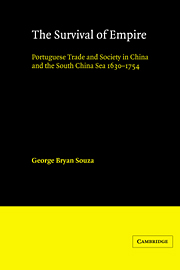Book contents
- Frontmatter
- Contents
- List of figures, maps and tables
- Glossary
- Notes on spelling and currency, weights and measures
- Preface
- 1 Maritime trade in Asia
- 2 Imperial foundations: the Estado da India and Macao
- 3 Population, personalities, and communal power
- 4 Country traders and Crown monopoly
- 5 Merchants and markets
- 6 Country traders and the search for markets
- 7 Imperial relations: Macao and the Estado da India
- 8 Imperial survival: Sino-Portuguese relations from Ming to Ch'ing
- 9 Macao, Companies and country traders: the other Europeans in China
- 10 Conclusion
- List of abbreviations and notes
- Primary Sources
- Bibliography
- Index
7 - Imperial relations: Macao and the Estado da India
Published online by Cambridge University Press: 24 October 2009
- Frontmatter
- Contents
- List of figures, maps and tables
- Glossary
- Notes on spelling and currency, weights and measures
- Preface
- 1 Maritime trade in Asia
- 2 Imperial foundations: the Estado da India and Macao
- 3 Population, personalities, and communal power
- 4 Country traders and Crown monopoly
- 5 Merchants and markets
- 6 Country traders and the search for markets
- 7 Imperial relations: Macao and the Estado da India
- 8 Imperial survival: Sino-Portuguese relations from Ming to Ch'ing
- 9 Macao, Companies and country traders: the other Europeans in China
- 10 Conclusion
- List of abbreviations and notes
- Primary Sources
- Bibliography
- Index
Summary
Macao's imperial relationship within the Estado da India over the seventeenth and into the eighteenth centuries was characterised by conflict and conspiracy. These manifestations of societal tensions revolved around the fundamental issues of economics and defence. Portuguese country traders, the Crown and the Church clashed within each group, and over which group would derive the maximum benefit from participating in maritime trade. These same groups had serious differences of opinion on Crown and communal defence decisions with reference to external threats to the survival of Macao.
Portuguese country traders at Macao actively protected their involvement in inter-Asian trade at two different levels. The first was external with the Senado da Camara, their collective representative embodiment, defending their political and economic interests against the Crown and other Portuguese municipalities. The second was internal, between different individual country traders and the representatives of the Crown and the Church at Macao. Varying degrees of competition, conflict and mutual co-operation were apparent within and between Macao, the Crown and the commercial elites of the various cities of the Estado da India. Crown administration, at the best of times, led these disparate communal and commercial interests in the direction of policies which were not always seen as being beneficial by local Portuguese societies.
Although conflict and tension were frequently present, there was general acquiescence by Portuguese communal groups vis-à-vis Crown authority and Goa interests on issues that did not threaten Macao's economic position.
- Type
- Chapter
- Information
- The Survival of EmpirePortuguese Trade and Society in China and the South China Sea 1630–1754, pp. 169 - 193Publisher: Cambridge University PressPrint publication year: 1986



